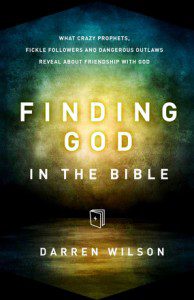 There is much I like about Darren Wilson’s Finding God in the Bible. Wilson images a God who wants to be our friend, who seeks intimacy and relationship, and to be the center of our lives. God wants good things to happen for God’s friends, even when God asks the impossible, for example, God’s command that Abraham sacrifice his only son Isaac. God has dreams for us far greater than our dreams for ourselves and when we follow God’s personal dreams for us, we can do great things. This is a Christianity worth believing, as emerging church leader Doug Pagitt proclaims.
There is much I like about Darren Wilson’s Finding God in the Bible. Wilson images a God who wants to be our friend, who seeks intimacy and relationship, and to be the center of our lives. God wants good things to happen for God’s friends, even when God asks the impossible, for example, God’s command that Abraham sacrifice his only son Isaac. God has dreams for us far greater than our dreams for ourselves and when we follow God’s personal dreams for us, we can do great things. This is a Christianity worth believing, as emerging church leader Doug Pagitt proclaims.
Darren Wilson’s book explores what it means to have a personal relationship to God and, more importantly, what it means for God to have a personal relationship to us. This is the best of evangelical popular theology taken to its theological and experiential conclusions. Darren Wilson even flirts with a vision of a God who is limited by our freedom of choice. In wanting us to be creative in God’s own image, God must contend with the impact of our creativity. As Wilson asserts in speaking of the relationship of Joseph and his brothers, “Instead of seeing God in Joseph’s story as a Puppeteer who is controlling everyone, I now see him [God] as the one who works with what’s available, however limited and meager that might be.” (107) God has a plan for our lives, but we and other people get in the way of God’s intentions to bless us. (106) All the heartache in the world is the result of decisions made by people, not by God. Wilson appears to be saying that God’s movements in the world are always contextual, concrete, and relational, not abstract and unilateral.
If Wilson believes what he’s saying, he has now moved beyond evangelical orthodoxy to affirm the freedom loving and creative God of process theology. He has placed God’s love and quest for abundant life for creation ahead of divine sovereignty. Wilson’s God appears to be very different than Rick Warren’s image of a god who plans the most important events of our lives without our input or John Calvin’s belief that God determines every event of our lives, including those who are saved and damned, in God’s eternal and inexorable plan. If so, this is a big leap beyond evangelical orthodoxy to a process-relational, Wesleyan approach to God’s relationship with the world.
This is good news for those who seek a kinder and gentler vision of God. While Wilson is not willing to go all the way, Finding God in the Bible opens the door to a vision of God characterized by relationship, open-endedness, and novelty, even for God. From this perspective, God has a vision for each moment of life and a grand perspective aimed at beauty and complexity in the universe, but leaves the details to us in a dynamic synergy of divine-creaturely interaction. God does not know the future as actual; for such knowledge would undermine human freedom and the practice of intercessory prayer. After all, what use are our petitions if the decisions have already been made in heaven. God knows, as a parent knows in relationship to a toddler, the array of possibilities available to the toddler, but these remain possibilities until they occur in real time. From time to time, the toddler – and ourselves – may surprise the parent by doing something unpredictable. Or, the child may influence the parental visions by her or his intercessions or by providing novel experiences to the parent, be that parent divine or human.
This open-ended approach to divine activity is, contrary to some “orthodox” positions, a biblical position. In a number of biblical narratives, God changes God’s mind; moreover Jesus’ ability to heal is related to the faith or unfaith of persons; and people are given the choice to say “yes” or “no” to God’s call in their lives. Freedom is real in the biblical story and God must adapt to it.
From this perspective, God is not in absolute control, nor is God all-powerful in contrast to many traditional understandings of God’s power. But, I would contend that a God who does not have everything planned out in advance or who does not know the sweep of history in some eternal vision is less powerful – and certainly less alive – than a God for whom new possibilities are constantly emerging in relationship to the ongoing actions of creatures. A God whose perfect vision of the future is all-encompassing and unchanging can never do anything new nor creatively respond to human creativity or destructiveness. God is stuck in unchangeable perfection, unable to do anything new. A relational, changing God can always do new things and imagine new possibilities. God’s affirmation of our creativity enables God to be more creative.
In an open system, the freedom of creatures to do new and wonderful things enables God to do new and wonderful things as well, including things that creatively and lovingly deviate from God’s moment by moment vision for us. Human freedom to do new things is not a fall from grace, but may contribute to the upward movement of the universe and to God’s own delight at the world.
This give and take is what relationship is all about. God shapes us and we shape God. God truly experiences our lives and is a different God with a different array of actions because of what happens in the world. God guides and we find our fulfillment in following God’s vision; but even here God does not want robotic obedience. Divine friendship wants us to be novel and shape God’s vision in our own way as our contribution to healing the world. Friends always have freedom and God affirms our freedom in all its complexity as part of the wonderful world God is bringing forth each moment of the day.
For more conversation on Finding God in the Bible — and to read an excerpt, visit the Patheos Book Club here.













